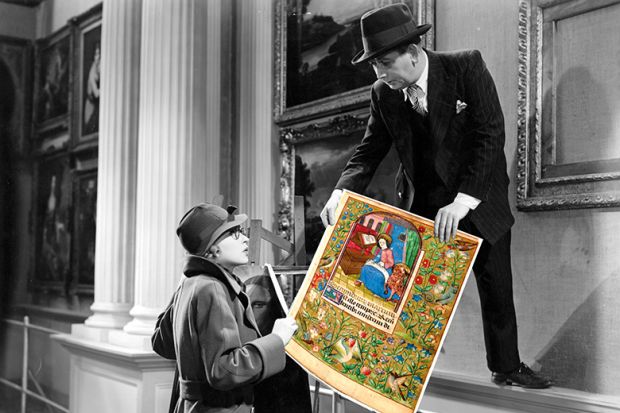When Peter Kidd contacted a university professor to ask why she had apparently plagiarised an image of a medieval manuscript from his blog, the response was unexpectedly rude.
“No one cares about your blog” was the reply from a secretary working for Carla Rossi, an adjunct professor at the University of Zurich who runs the Swiss-based Research Centre for European Philological Tradition, known as Receptio.
Threats of legal action if the Oxford-based independent researcher pursued his “delusional” claims followed, while the former curator of medieval manuscripts at the Bodleian and British libraries was told that “blogs are not scientific texts…so their value is nil”.
Perhaps the most surprising element of this exchange is the suggestion that Professor Rossi’s secretary – Noemi DeSantis – may not have existed at all as her profile picture was a stock photo used countless times on other websites. Indeed, investigations by Mr Kidd and other Twitter users revealed that many of the profiles of Receptio staff and board members, even supposed scholarship winners, used stock photos imposed on an identical backdrop of a well-stocked bookcase.
Further confusion surrounds the London headquarters of Receptio Academic Press – depicted as spacious modern offices but, in fact, a PO box address used by 270 other businesses.
The ins and outs of the drama have gripped Twitter users, one of whom described the affair as “similar to an Umberto Eco thriller” given its incredible twists and turns.
The latest plot line in the so-called #ReceptioGate – which another scholar called “an academic car crash in slow motion” – is a sinister trolling campaign in which a newly created anonymous Twitter account (now deleted) likened Mr Kidd to a “hysterical queer” and a “sewer rat”, adding: “Coming to get you,” and “Do you really think you’re safe?” It is not known who is behind the account.
Nonetheless, Receptio believes that it, and Professor Rossi, is the wronged party. It has issued a statement claiming that it is “currently the victim of a barbaric smear campaign” and has “nothing to be ashamed of, unlike those who in recent days have been guilty of slander, defamation, incitement to hatred, and stalking, which are criminal offences”. Receptio did not respond to Times Higher Education’s request for comment.
For his part, Mr Kidd said he had had little interest in highlighting what he saw as extensive plagiarism of his blog, Medieval Manuscripts Provenance – which contains colourised images from the Book of Hours of Louis de Roucy, an illustrated 15th-century devotional text that he obtained from a private collection – until he learned that Professor Rossi had published a book using the images. Professor Rossi claimed that she had recolourised a black-and-white image from a catalogue of the German auction house Hartung & Hartung rather than use Mr Kidd’s blog, which, her secretary said, she was not aware of – a claim he described as “nonsense”.
“I am generally a private person – I certainly did not intend to stir up a hornet's nest and attract all this attention. I have other things to do, like submit an article in the next few days,” Mr Kidd told THE.
Indeed, Mr Kidd’s blog explained that he had ignored concerns about Professor Rossi’s citation of his work – which he believed incorrectly downplayed his scholarship on the De Roucy text – for months before noticing that his name did not appear anywhere in the final version of her book.
“If she had contacted me at the outset, I would have willingly shared with her all my images and scans of auction catalogues…as I have done with other people who take an interest in manuscripts I have studied,” he explained.
The scale of alleged distortion by Receptio – which claims that its “under construction” website was “outdated for some time” – means that the story has acquired a level of intrigue beyond the standard academic spat over citation practices.
Some commentators have surmised that Professor Rossi may have created many aspects of the Receptio site, with speculation that it helped her to obtain funding from the Swiss National Science Foundation (SNSF), as she has done in recent years.
That claim is denied by Receptio, which states that it “has not received project grants from the SNSF” and had received only smaller open access publication grants. On its unusual listing of staff on its now-updated website, it also asks, “What exactly does a website under construction have to do with the academic activity of its director?” in reply to the claims.
However, many believe the bizarre episode – which is being investigated by the University of Zurich – has important lessons for academia – not least how illustrious websites boasting impressive affiliations to attract funding for research might also face tough questions.




